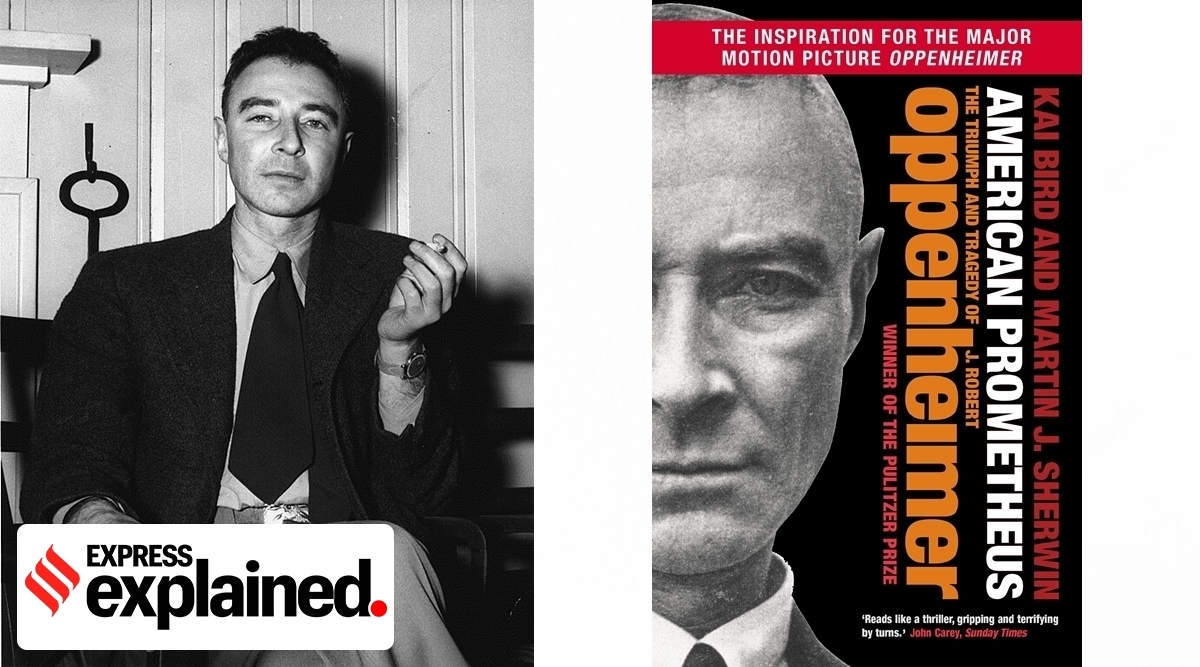Explained Books | A window into the life and times of J Robert Oppenheimer
As Oppenheimer opens in theatres, a look at the masterpiece on which Nolan based his film.
 American Prometheus is a deeply personal biography of J Robert Oppenheimer, which weaves in the socio-political context of his times. (Wikimedia Commons)
American Prometheus is a deeply personal biography of J Robert Oppenheimer, which weaves in the socio-political context of his times. (Wikimedia Commons) In Greek mythology, Prometheus stole fire from the Olympian gods and gave it to humanity, thus equipping mortals with the means to spread civilisation. For his transgression, he was damned to eternal torment by Zeus, the king of the Olympians.
In western tradition, Prometheus has represented the eternal quest of humans for knowledge, and the tragedy that often accompanies this quest. For a biography of scientist J Robert Oppenheimer (1904-1967), the title American Prometheus is apt. It captures the tragedy of Oppenheimer’s life as much as the weight of his achievements, and sets up a book that is meticulously detailed and emotionally engaging.
Written over a period of 25 years by Kai Bird and Martin J Sherwin, American Prometheus (2005), won the Pulitzer Prize in 2006 in the category of Biography. A new paperback edition of the book, which is the inspiration for Christopher Nolan’s epic film that released worldwide on Friday (July 21), was published earlier this year.
American Prometheus draws from Oppenheimer’s own writings, years of FBI surveillance records, and interviews with some of his closest friends and peers. It paints a gripping portrait of the ‘father of the atomic bomb’, who was ostracised by the political establishment of the very country he strove to protect.
“He is America’s Prometheus…an immensely human figure, as talented as he was complex, at once brilliant and naive, a passionate advocate for social justice and a tireless government adviser whose commitment to harnessing a runaway nuclear race earned him powerful bureaucratic enemies,” the book says.
American Prometheus works on multiple levels to tell the story of Oppenheimer and his times.
It is first and foremost a deeply personal biography, replete with anecdotes from throughout Oppenheimer’s life. Largely chronological, it builds up, bit by bit, his complex and evolving persona. In doing so, it attempts to provide a better explanation of the more public and well known aspects of his life.
For instance, the book situates Oppenheimer’s sympathies for communism in his highly privileged and protected upbringing. “Somehow one always knew he felt guilty about his gifts, his personal wealth,” it quotes a close friend as saying.
It also chronicles Oppenheimer’s quirks and eccentricities, anger and frustrations, optimism and fears, and perhaps most importantly, his intricate thought processes and oft conflicted ethical compass.
At another level, the book tells the story of the developing field of nuclear physics in the early to mid 20th century. Through the story of Oppenheimer and his contributions, the book details the progress made in physics at the time, the culmination of which — in the book — is the development of the atomic bomb.
About Oppenheimer’s time at the laboratory in Los Alamos and his work in building the atomic bomb, the book goes into a lot of detail, with an entire section dedicated to it. This section, like the rest of the book, weaves a number of themes into a coherent, tense narrative, depicting the technological, logistical, ethical, and political challenges faced by Oppenheimer’s Avengers-like team of scientists and engineers.
Lastly, the book is in many ways a history of the US during the decades preceding and succeeding World War II. Through the telling of Oppenheimer’s story, it opens a window to the times he lived in, right up to the McCarthyite ‘Red Scare’ of which Oppenheimer would become the most famous casualty.
Over the years, Oppenheimer’s life has fascinated many, not least because of how easily it lends itself to so many popular archetypes — tortured genius, tragic hero, and philosopher scientist. American Prometheus too utilises these tropes, but without ever descending into cliche. It simply states facts borne out of years of rigorous research. The tragedy tells itself.
=======================
American Prometheus: The Triumph and Tragedy of J. Robert Oppenheimer
Kai Bird and Martin J Sherwin
Atlantic Books
770 pages
Rs 799 (paperback)
- 01
- 02
- 03
- 04
- 05






































